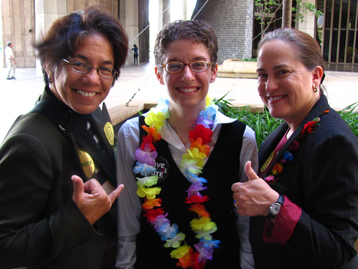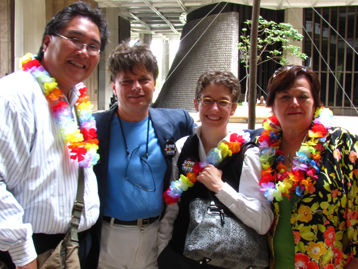On April 29, 2010, the last day of its legislative session, the Hawai`i House of Representatives voted to grant the state's straight and gay couples the right to join in civil union, following a similar vote earlier this session by the state senate. The historic vote took many observers by surprise.
"It was amazing being there. Everyone was on the edge of their seats," said Loren R. Javier, Lambda Legal's Western Regional Director. "In fact, even when the House went into caucus, the signs were that there were not enough votes. When the bill passed 31 to 20, everyone was visibly stunned. It wasn't until people silently walked out of the House chamber that the tears began to flow and there was much jubilation."

Equality Hawaii Co-Chair Tambry King, Lambda Legal Staff Attorney Tara Borelli and Equality Hawaii Board Member Suzanne King

Lambda Legal Western Regional Director Loren Javier, Equality Hawaii Board Member Don Bentz, Lambda Legal Staff Attorney Tara Borelli, and PFLAG Oahu President Carolyn Golujoch.
The bill, H.B. 444, "extends the same rights, benefits, protections and responsibilities of spouses in a marriage to partners in a civil union."
Now Republican Gov. Linda Lingle has 45 days—until July 6—to sign the bill, veto it or allow it to take effect without her signature. A veto override would require three additional votes in the House.
Lambda Legal Senior Counsel and Marriage Project Director Jennifer Pizer was in her hotel room in Honolulu putting the finishing touches on court papers when she got the text letting her know she will not need to file our complaint next week.
"We were already on O`ahu this week in final preparations for litigation if the legislature failed to act by today's end of session," Pizer said.
"We're delighted that, as long as Gov. Lingle does not veto the bill, our lawsuit won't be necessary."
"Today's vote was down to the wire, but it represents years of steady work by Hawai`i's lesbian, gay, bisexual and transgender (LGBT) community and by concerned state legislators," Pizer said. "There's no denying it's been a bumpy road, but like all arduous journeys, it makes arriving at the destination that much sweeter."
Lambda Legal began to fight for marriage equality in Hawai`i decades ago, joining as co-counsel in litigation that resulted in the landmark 1993 state supreme court ruling that denying the right of same-sex couples to marry is discrimination the government must justify. At trial in 1996, we proved the state has no adequate reasons to continue to exclude lesbian and gay couples from marriage.
While the case was on appeal, voters changed the Hawai`i Constitution to reserve to the legislature exclusively the power to provide marriage equality. The "reciprocal beneficiary" status created in the same period has provided some important legal protections, but in a confusing, patchwork manner with many problematic gaps.
"All these years later, same-sex couples and their families still have been far from the goal of full equality. Last night, they got one big step closer," Pizer said. "Marriage equality remains the essential finish point. And along the way, the incredible activists and allies in Hawaii have been pushing tenaciously for all the same legal rights and benefits available under state law to heterosexual couples through marriage. Thousands of Hawai`i families are terribly vulnerable right now, in need of the critical protections that civil unions will provide. We hope the governor will sign the bill promptly, or at least allow its basic, humane safeguards to take effect without her signature."
